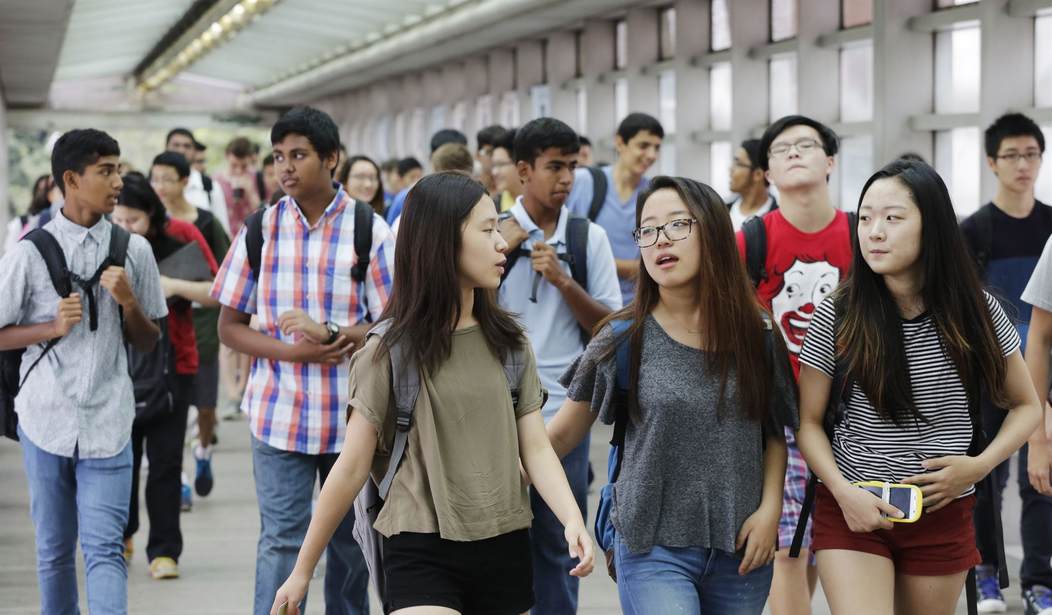The Boston Globe published an uncharacteristically blunt report this week about the Boston public school system and issues involving race. But this tale is very different than other reports where “bad white people” are devaluating the lives of Black and Hispanic attendees. Recent satisfaction surveys conducted among Boston students reveal that Asian American families report some of the least positive interactions between their children and the school staff as well as the other students. Despite almost always being among the top performers in the schools, many of the children report feeling “invisible.” The article features a sophomore at the John D. O’Bryant School of Math and Science named Ngan Huynh. She says that even many months into the school year, she has yet to meet a single teacher who can correctly pronounce her name. And this situation has made her feel isolated and ignored.
Huynh’s experience is common among Asian American students in Boston Public Schools, who, according to a recent analysis of school climate survey data, are more likely to report feeling isolated and undervalued compared with their white, Black, and Latino peers. The study, commissioned by members of the Massachusetts Asian American Educators Association, reinforced what many Asian American students, teachers, and community leaders have long suspected: Although they perform better, on average, on standardized tests and are more likely to graduate high school on time, many Asian American students feel overlooked and invisible.
“The dominant narrative out there in Boston Public Schools, as well as many other places, is that Asian students are doing fine,” said former BPS teacher Go Sasaki, who spearheaded the study, along with Rosann Tung, a retired education researcher. “Based on our experiences and anecdotes, we know that is not the case.”
For the record, it took me all of one minute online to learn that the student’s name is pronounced ‘Nung‘ (rhymes with sung) ‘Hwin‘ (as in the word “win” with an audible “h” in front of it). But not one teacher at that school could be bothered to make the effort? That really seems to say something about the district’s teachers and scholastic environment.
Imagine for a moment that you are a teacher in the Boston public school system and a new Black student arrived with a nontraditional but increasingly common name that wasn’t immediately obvious from the spelling, such as Shauntelle. You can rest assured that you would get off the stick and learn how she pronounced it on day one if you wanted to keep your job. You would feel an equal amount of urgency to refer to your Hispanic students as LatinX even if they think it’s a stupid word. And God forbid you get anyone’s pronouns wrong or your transphobic butt would head headed for the curb before the next bell rang.
But when an Asian student who is one of your top performers walks into the classroom? Why bother, right? What does it matter?
This is the same pattern we see playing out in the ongoing scholastic War on Merit. Advanced placement schools with the highest college acceptance rates are typically populated with a majority of Asian-American students. But now we have activists pushing to remove all of the standardized testing requirements so the student body will “look more like the community.” And the performance ratings at those schools almost immediately drop.
In the survey, students were asked to rate their school experience in sixteen different categories, with a rating of 1 being the best experience and a rating of 4 being the worst. The surveys were broken down by racial affinity. In ten of the sixteen categories, the Asian student reported the lowest ratings. These included their sense of their physical safety, sense of belonging, cultural relevance, and how interested they believed the teachers are in their education.
Something like this doesn’t happen by accident. This is a cultural issue, and I’m not talking about the leftist definition of “culture.” Benefits set aside for “minority students” frequently do not include Asian Americans. These primarily leftist academics only view children as “minorities” if they are Black or Hispanic.
Everyone is quick to remind you of the history of racism and oppression against Black people in America and they certainly have some valid points to make. But what almost always seems to be forgotten is the treatment that the first Asians arriving in America received, particularly Chinese immigrants in the western states. And then there were the internment camps during world war 2. Asians have had to overcome a lot also. Will anyone be held accountable for this? Will Boston’s public schools leap into action? I’ll be pleasantly surprised if it happens, but I won’t be holding my breath.








Join the conversation as a VIP Member